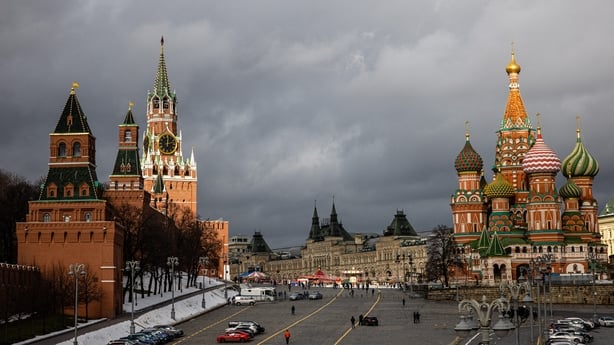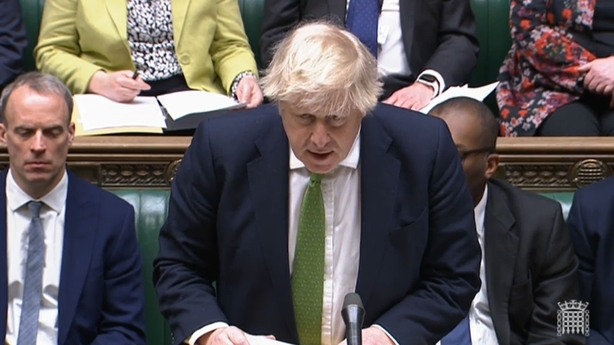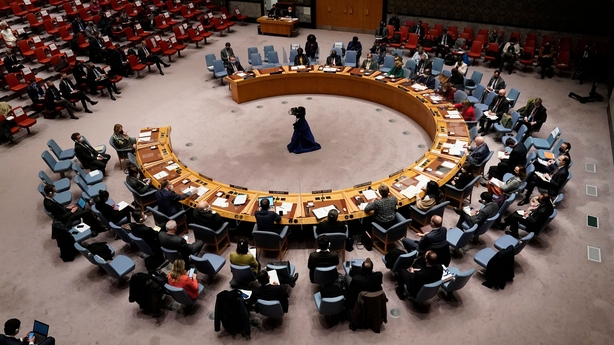US President Joe Biden said the United States was imposing a first tranche of sanctions against Russia for "the beginning of a Russian invasion of Ukraine".
He promised that more sanctions would come if Moscow goes further into the country.
Mr Biden, speaking to reporters at the White House, said the United States would impose sanctions against two large Russian financial institutions and Russian sovereign debt.
Starting tomorrow, he said, sanctions would begin against Russian elites and their family members as well.
Yesterday, President Vladimir Putin told Russia's defence ministry to deploy what he calls "peacekeeping" forces into two breakaway regions of Ukraine after recognising them as independent, defying Western warnings that such a step would be illegal and wreck peace negotiations.
"This is the beginning of a Russian invasion of Ukraine," Mr Biden said.
"Russia has now undeniably moved against Ukraine by declaring these independent states."
We need your consent to load this rte-player contentWe use rte-player to manage extra content that can set cookies on your device and collect data about your activity. Please review their details and accept them to load the content.Manage Preferences
The United States had promised severe sanctions against Russia in the event it invades Ukraine, which the White House has previously defined as "any movement of troops across the border".
Mr Biden said the sanctions in the initial tranche applied to VEB bank and Russia's military bank, referring to Promsvyazbank, which does defence deals.
He said the sanctions against Russia's sovereign debt meant the Russian government would be cut off from Western financing.
"As Russia contemplates its next move, we have our next move prepared as well," Mr Biden said.
"Russia will pay an even steeper price if it continues its aggression, including additional sanctions."
'To put it simply, Russia just announced that it is carving out a big chunk of Ukraine,' US President Joe Biden has said, adding that 'this is the beginning of a Russian invasion of Ukraine' | Read more: https://t.co/jDic18NwoT pic.twitter.com/XQLLdY1rkD
— RTÉ News (@rtenews) February 22, 2022
Mr Biden said he expected the Kremlin to start a war and that "none of us should be fooled".
"He's setting up a rationale to take more territory by force," Mr Biden said in an address from the White House.
The US President told reporters: "We still believe that Russia is poised to go much further in launching a massive military attack against Ukraine."
He said: "There are still well over 150,000 Russian troops surrounding Ukraine, and as I said, Russian forces remain positioned to Belarus to attack Ukraine from the north, including warplanes and offensive missile systems.
"Russia's moved troops closer to Ukraine's border with Russia.
"Russia's naval vessels are manoeuvring in the Black Sea to Ukraine's south including amphibious assault ships, missile cruisers, and submarines.
"Russia has moved supplies of blood and medical equipment into position on their border. You don't need blood unless you plan on starting a war."
EU agrees package of Russia sanctions
Earlier, EU members agreed a package of new sanctions against Russia that aims to inflict severe damage on the country after its recognition of breakaway regions in Ukraine, the EU foreign policy chief said.
The 27 members of the EU unanimously agreed the measures at an informal meeting in Paris on the sidelines of an international forum, EU foreign policy chief Josep Borrell said.
The sanctions will also target Russian parliament members who backed recognising the breakaway regions as independent, a decision announced by President Putin yesterday.

"The sanctions will hurt Russia and will hurt a lot," Mr Borrell said at a press conference with French Foreign Minister Jean-Yves Le Drian.
Targets for asset freezes and visa bans included 351 members of the Duma, Russia's lower house of parliament, who appealed to Mr Putin to recognise the two regions as independent, he added.
Mr Le Drian, whose country holds the rotating EU presidency, said the member nations had "unanimously agreed on an initial sanctions package".
He accused Russia of "violating international law" and "breaching its commitments".
Mr Borrell said the EU also agreed to target 27 individuals and entities "who are playing a role in undermining or threatening Ukrainian territorial integrity, sovereignty and independence".
Banks financing Russian decision-makers and other operations in those territories are also being targeted, he said.
Mr Le Drian said he would also cancel the Paris invitation to his Russian counterpart Sergei Lavrov for talks in the wake of Mr Putin's announcement on the recognition of the breakaway regions.
Announcing his decision, Mr Le Drian said that recent developments had shown that Mr Putin "no longer honours Russia's signature" on international accords.
Mr Borrell added however that "diplomatic action will continue to avert a war in the heart of Europe".
German Chancellor Olaf Scholz said the certification of the Nord Stream 2 project cannot go ahead given Russia's latest actions.
Germany's decision to put the Nord Stream 2 gas pipeline project on ice is arguably the most far-reaching reaction to Moscow's moves.
"We've got to ensure that whatever happens, Russia will feel the pain ... to make sure Russia has absolutely no incentive to go further," Minister of State for European Affairs Thomas Byrne said.
Canadian Prime Minister Justin Trudeau also announced economic sanctions on Russia, saying Moscow's actions against Ukraine were "a further invasion of a sovereign state, and it is completely unacceptable".
"We will ban Canadians from engaging in purchases of Russian sovereign debt. And we will apply additional sanctions on to state-backed Russian banks and prevent any financial dealings with them," Mr Trudeau said, announcing a series of measures.

Earlier today, Britain imposed sanctions on five Russian banks and three billionaires, in what British Prime Minister Boris Johnson called "the first barrage" of measures in response to the Kremlin's actions in Ukraine.
Addressing the UK parliament hours after Russia ordered troops into two Moscow-backed Ukrainian rebel regions, Mr Johnson described the move as "a renewed invasion" of its western neighbour and "pretext for a full-scale offensive".
"The UK and our allies will begin to impose the sanctions on Russia that we have already prepared... to sanction Russian individuals and entities of strategic importance to the Kremlin," he told MPs.
The five banks targeted - Rossiya, IS Bank, General Bank, Promsvyazbank and the Black Sea Bank - and three people sanctioned will see any UK assets frozen.
The individuals concerned - Gennady Timchenko, Boris Rotenberg and Igor Rotenberg - will be barred from entering Britain and all UK individuals and entities will be banned from dealing with them and the banks.
"We cannot tell what will happen in the days ahead," Mr Johnson added in the House of Commons, amid cross-party condemnation of Moscow's actions.
"But... we should steel ourselves for a protracted crisis."
Taoiseach Micheál Martin said that the announcement by Vladimir Putin yesterday "crosses a line" and was "a flagrant violation of international law". He said that Ireland stands in solidarity with Ukraine, and that the EU's response will be "robust" | https://t.co/ZAcrKAYA3H pic.twitter.com/Vx1RQlxMXc
— RTÉ News (@rtenews) February 22, 2022
Taoiseach Micheál Martin said Russia's move "crosses a line".
Speaking in Berlin, Mr Martin said that Mr Putin's announcement "breaches the fundamental principles of the UN Charter, under which all members must refrain from the threat or use of force against the territorial integrity or political independence of any state.
"It is a flagrant violation of international law and a breach of Ukraine’s sovereignty. As I have said, together with our EU partners, Ireland stands in solidarity with Ukraine."
When asked by RTÉ News how swiftly he believes sanctions will apply following the Foreign Affairs Council meeting in Brussels this afternoon, Mr Martin said: "Unity is our strength and there is very clear unity of purpose between all of the EU member states in relation to this issue.
"From Ireland's perspective as a small open democracy, we celebrate 100 years of unbroken democracy this year and the sentiments articulated last evening by President Putin are not acceptable to us, in the sense that small states are entitled to their nationhood, to their freedom and to their independence.
"I think the statement creates a chilling effect for many smaller states across the European continent."
Russia 'behaving like a rogue aggressive state' - Coveney
Meanwhile, the Minister for Foreign Affairs has said that "Russia is behaving like a rogue aggressive state and we are calling them out on that."
Speaking on RTÉ's Prime Time, Simon Coveney said: "We are using some of the tools available to effectively protest at the decision Russia has made, but we are also continuing to leave a door open for dialogue to try to defuse a situation."
The minister said it is important to keep dialogue with Russia, despite all the tension over the last 24 hours because the alternative to diplomatic intervention is "the largest conflict that we would have seen potentially since World War 2 on the continent of Europe, that is a horrific prospect".
He said "undoubtedly" sanctions would result in a dramatic increase in gas, oil and coal prices.
"It would undoubtedly have a significant impact on energy prices and that will impact on Ireland, there is no doubt about that" he said.
Read more: How Western sanctions might target Russia
US and allies lambast Russia over Ukraine at UN Security Council
The US and its allies rounded on Russia during an emergency UN Security Council session last night, denouncing the Russian president's recognition of rebel-held areas in Ukraine and his ordered deployment of troops as a gross violation of international law and "pretext for war".
Addressing the council, US Ambassador Linda Thomas-Greenfield heaped scorn on Mr Putin's assertion that the Russian troops would take on a peacekeeping role in the Donetsk and Luhansk areas.
"He calls them peacekeepers. This is nonsense. We know what they really are," Ms Thomas-Greenfield said.
Ukraine's ambassador Sergiy Kyslytsya insisted that his country's borders remain "unchangeable" despite Russia's actions.

Ireland's ambassador to the UN Geraldine Byrne Nason called Russia's actions "a flagrant violation of international law," saying the "unilateral step" had "cast into doubt all the diplomatic efforts of past weeks".
Meanwhile, Russia's ambassador to the UN, Vasily Nebenzya, said Moscow is still "open to diplomacy for a diplomatic solution" - but warned against what he dubbed Ukrainian aggression.
"Allowing a new bloodbath in the Donbass is something we do not intend to do," he added, referring to the region encompassing Donetsk and Luhansk.
Mr Putin's order has been widely seen as paving the way for an operation to deploy part of the potential invasion force he has massed on Ukraine's borders.
In a lengthy televised national address announcing his recognition of the rebel-held areas, Mr Putin railed against Ukraine as a failed state and "puppet" of the West, repeatedly suggesting it was essentially part of Russia.
Ms Thomas-Greenfield said the speech amounted to a "series of outrageous, false claims" that were aimed at "creating a pretext for war".
Her remarks came just before a White House spokesperson said that Washington would today impose sanctions on Moscow following Mr Putin's order.
Additional reporting Paul Cunningham

